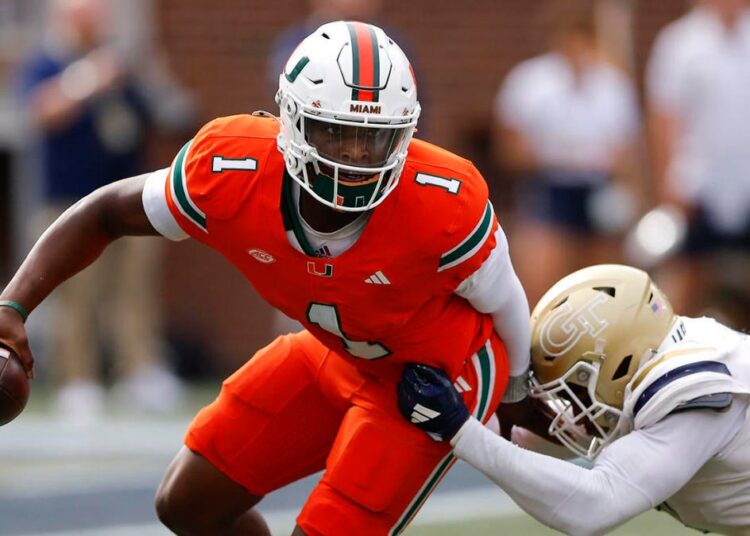The magic ran out for Miami on Saturday, and what would have been a fourth double-digit comeback of the season effort fell short at Georgia Tech.
The No. 4 Hurricanes had become so accustomed to riding QB Cam Ward’s second-half heroics during a 9-0 start to the season, that even into the game’s final possessions there was a belief that the star quarterback was gearing up to do it again. But then Georgia Tech effectively ended those comeback hopes with a strip-sack of Ward in the final minutes to seal a 28-23 victory. The defeat highlighted some of Miami’s weaknesses as a national title contender, but also how the team had become over reliant on Ward’s magic to keep them in that national title picture.
It’s hard to blame Miami for positioning Ward as the center of the team’s universe, because to this point he had been the most outstanding quarterback in college football. From stacking statistics to delivering in huge moments, Ward has separated himself from every other signal-caller in the game. And through 10 games, he has already put together one of the best single-season performances in program history. And while there were a few errant throws against Virginia Tech and a showing against Florida State that shockingly didn’t include 300 yards passing and multiple touchdowns, Ward could be counted on to be the best player on the field in every single game.
But the fact that Ward has had to play at an elite level to lead Miami in three double-digit, second-half comebacks brought concern regarding the sustainability of the Hurricanes success. What would happen if Ward had a bad game? Or maybe the margin for error was so slim that Ward could not even afford to have an average performance. The loss to Georgia Tech exposed Miami as a team that does not just benefit from having the sport’s best quarterback, but cannot afford for him to be anything other than excellent.
By the end of the game, Ward’s stats fell more in line with his season averages: he threw for 348 yards and three touchdowns on 25 for 39 passing. But he was just 9 of 18 in the first half for 133 yards — 74 of which came on one touchdown play — and the Hurricanes offense failed to convert on four of its first five third-down attempts.
The offense’s inability to generate any kind of consistency allowed Georgia Tech to continue to lean on Miami’s defense with their methodical rushing attack. And that Hurricanes defense has continued to be a point of concern due to injuries up and down the depth chart, as well as a tendency to allow explosive plays. But those defensive concerns have usually been masked by Ward and a Hurricanes offense that was among the top units in the entire country, averaging 47.4 points per game and 556.9 yards per game heading into the weekend.
When we think about championship contenders, especially in this expanded College Football Playoff era, one key quality is the ability to find a way to win when a team doesn’t have its fastball. Miami’s fastball is Ward, and it took too long for him to get going for the Hurricanes to reclaim control of a game that Georgia Tech was winning with physicality and some huge defensive stops. Seven of Miami’s 10 offensive possessions got inside the Georgia Tech 40-yard line, but only four resulted in scores and only three of those were touchdowns. A trio of fourth-down stops by Georgia Tech’s defense continued stifle the belief that Ward was going to be able to get Miami out of a jam for the fourth time this year, and as the game went deeper into the fourth quarter, the sense of desperation impacted decision-making on the field and on the sideline.
Miami did not have its fastball, and it did not have a counter, and what is left is a sharpened focus on the team’s imperfections now that its record is not perfect.
The good news for Miami is that many of its goals are still as attainable. The Hurricanes will be off in Week 12 then back in action with games against Wake Forest and Syracuse to close out the year. A head-to-head win against Louisville gives Miami the tiebreaker edge over Clemson, so as long the Hurricanes win out they will play for the ACC Championship Game. Winning the conference title would be a landmark moment for the program — Miami has never won the ACC in 20 years of conference membership — and it would also likely give the team a first-round bye in the CFP.
But what if the same imperfections that spoiled an undefeated regular season prevent Miami from winning the ACC? An 11-2 record would certainly be worthy of consideration for an at-large spot in the playoff, but there is no guarantee of inclusion in that circumstance. Miami needs to spend this off week getting healthy, shoring up issues with a leaky defense, and developing an off-speed option when the fastball isn’t working. Because competing for championships, which is what Miami will be effectively doing in every single game it plays from here on out, requires a more well-rounded performance than what the Hurricanes delivered in Atlanta on Saturday.
Read the full article here


























Discussion about this post